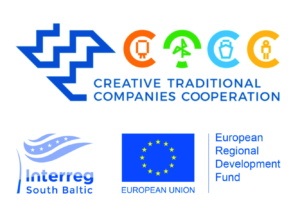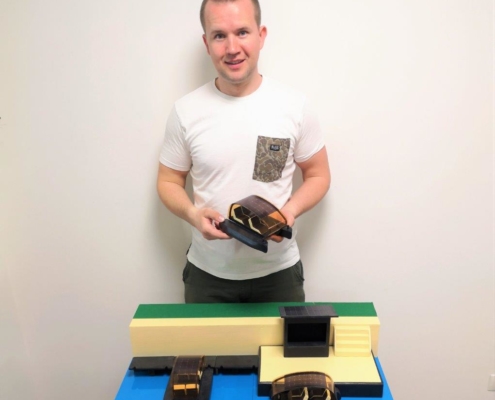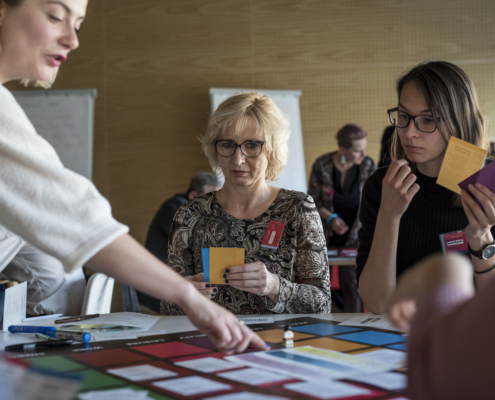Timeline & Success Stories
July – December 2017
26-27 September 2018
9-11 October 2018
5-6 November 2018
21-23 January 2019
4-5 April 2019
February – August 2019
10-11 October 2019
18-22 November 2019
21-22 January 2020
CTCC SUCCESS STORIES
Boosting of Marketing of JSC Western Shipyard with the Help of CTCC Online Training
More openness, more space for fresh ideas and meaningful collaborations – a team of Klaipėda Science and Technology Park (KSTP), is delighted to see that traditional businesses from the green and blue sectors are gradually transforming. Industries are looking for some attractive tools for boosting their creativity and growing competencies that would enable the development of new products or services. And the CTCC project has something valuable to offer!
“Live workshops organized in the framework of this project unlocked intense discussions and insights of our international experts – we had many positive feedbacks from our participants. This phase is over, anyway, our activities continue –now in the form of the online training that is focused on design for creativity and innovation for SMEs. This platform is open to anyone willing to learn and discover. Anyway, we are very glad to see the enthusiasm of our traditional companies”, – said Erika Zavackienė, Innovation Manager at the KSTP.
Kristina Cukalina, Marketing Manager of the JSC Western Ship Agency, took part in two live workshops in Klaipeda and Gdynia – the content and personal engagement helped in building a strong confidence that design thinking and other creative methods can be used even in very “stiff” and specific areas, which seemingly are quite difficult to accept change.
By her own example team member of the Western Ship Agency demonstrates a modern approach to everyday challenges and keeps on growing her professional skills: this year Kristina started her master’s degree in marketing at the Klaipeda University. Also, she became one of the first “pioneers” in Klaipeda to test the online training program created within the framework of the CTCC project and received an official statement of participation: “No doubts that this form of training is very convenient for the working or studying person. The course gave me an opportunity to consolidate and extend the knowledge I have already gained. However, one could also join the training starting from the very basic things and gradually build useful knowledge, competencies, and qualities that could open many new doors in your professional life”.
Management & Business Consultancy Spurring the Rietavas Startup Growth
Another success story of the CTCC project started during the seminar Design Thinking for Innovation in Klaipeda. A start-up entrepreneur Darius Ripkauskas from Lithuania, who gave up a well-paid job and set up his own business, got the support of his idea of constructing stylized shelves for collectors and kids from the workshop mentors. Mr. Ripkauskas started to work on his project and soon he began to receive orders for the stylized shelves from America, Canada, Great Britain, Italy, Germany, and Slovenia. Later on, at the Design Talks Business Conference in Gdynia, which was a part of the CTCC project and aimed to establish a creative broker platform bridging traditional and creative sectors, D. Ripkauskas was consulted by other participants about management and business development. That helped him to expand his business and start to produce souvenirs, representing the Rietavas, which are in high demand these days because of the tourism growth in the region.
Collaboration of Polish Companies for Creation of New Garden Furniture
One more example of the CTCC project’s success is the story from the Association of Polish Communes of Euroregion Baltic / ERB. During the project’s workshops three companies: Modei Sztuka & Design, CGP Sp. Z o.o. and Termdach focusing on architecture, It and renewable energy, respectively, got to know each other and started to work together on one project. The project aims to create garden furniture made of concrete. The further plans are to produce furniture from the materials which are lighter and easier to process.
Each of these companies employs less than 5 employees and orients on the local market nevertheless all the businesses involve cooperation with foreign partners. Participation in the CTCC project was a great opportunity for the companies to enlarge their network and elaborate new business ideas through the engagement in workshops.
Promotional Video Materials for Forest Paradise
One more success story from Lithuania is disclosing the potential of cross-border cooperation between creative and traditional industries.
The young and enthusiastic CEO of UAB INJO Project, Inga Joce, with the help of her degrees in Design and Architecture created an attractive, minimalist, ergonomic space for relaxation and entertainment in the heart of the woods. This place is called Forest Paradise and it offers exceptional experiences such as horseback riding, crazy holidays for kids, spa treatments and even a survival camp. All entertainments are provided privately in a peaceful and quiet atmosphere.
To attract more clients, Inga needed to create a promotional presentation of “Forest Paradise” with video operators. During the Design Talks Business Conference in Gdynia which was a part of the CTCC project, Inga has met other participants and gained some consultancy about marketing and business development.
Inga started collaborating with Valdas, who is filming commercials and other videos, that became a perfect partnership between two businesses.
Software Tool for Individual Gardening Solutions
Within the framework of the CTCC project (Creative Traditional Companies Cooperation), the designer Nils Remer from Wismar, Mecklenburg-Western Pomerania, developed in collaboration with local gardening and construction companies an easy-to-use software tool for the individually attractive design of garden elements and house building areas.
The developed software combines the individual design wishes with the variability of garden and landscaping products. The application software convinces with a user-friendly and well-arranged modular concept. In contrast to other, more complex applications, the shop library focuses on an individual photo of the location and possible design solutions with existing products and services. This combination enables the user to visualize and implement concrete design ideas easily and quickly.
Advantages of the software:
– the individual program interface and product library,
– direct start of the software without installation,
– individual user photos as a design basis,
– user-friendly program structure and quickly visualized results,
– automatic determination of the required sizes and quantities.
A Business Model for Sales of an Innovative Device for Eco-Friendly Inland Vessels
The Design Talks Business Conference which was held under the auspices of WP 4.9 – Intensive Training on Creative Audit Tool, and aimed to establish a creative broker platform bridging traditional and creative sectors as well as integrate creative knowledge and skills for more innovation in traditional SME’s has borne its fruits.
The hands-on effect of the Design Talks Business Conference in one success story of the Shipadviser Andrzej Kryżan:
Mr. Kryżan is retired captain with academic background had created a new device reducing air pollutants in exhaust gases from internal combustion engines of inland vessels, to make river transportation environment-friendly. Due to the lack of connections in business, he was incapable to put his idea into real life by himself, therefore he was looking for a business partner.
During the Design Talks Business Conference in Gdynia, Mr. Kryżan had met another participant (Mr. Samborski) invited to the event by project partner – Media Dizjan and discussed his idea. Mr. Samborski decided to join Mr. Kryżan’s team to develop the business model together
At this moment partners are in the middle of the evaluation process of the idea with potential customers.
New business model for JSC Western Shipyard
Enjoy the video from our partner Klaipėda Science and Technology Park (KSTP) showing the fascinating and inspiring results of the traditional-creative companies cooperation in Klaipeda. This video has been prepared as part of the project Creative Traditional Companies Cooperation / CTCC, which is funded by the European Union under the Interreg South Baltic Programme.
In 2018 Western Baltic Shipyard together with creative industries and with the help of Science and Technology Park launched a new space for creative industries in Klaipeda. This building previously hosted administration of the shipyard, but for quite a while it was empty. The building is located near Klaipėda oldtown, in the heart of the city and it became a perfect place for designers, photographers, artists, painters, and other creative minds.
The mission of KMTP Castle Workshops is to provide the necessary space for creativity, crafts, prototyping and to gather representatives of the creative industries of the port city under one roof, whose cooperation would encourage starting and developing businesses, laying the foundations for the formation of the Creative Industries Cluster.
The KMTP team at the Castle Workshop aims to promote the application of new technologies in the development of various products or services, help residents set guidelines for business development, measure risks and make appropriate decisions to avoid painful mistakes.
To find the best way how to transform this real estate to business was used The Business Canvas model.
For JSC Western Shipyard this developed business model perfectly revealed the potential of the real estate and the possibilities of its use. Using the Canvas business model has helped better plan and identify sources of value creation and see the connection with business strategy. Market research, competitive environment analysis, a consumer (customer) needs analysis, and modeling of future service changes were performed using this model. JSC Western Shipyard has adopted this business model and now the company is working on its implementation.
More details are in the report below
Prototype of a Pier for Popa Boat Catamarans
Lithuanians developed a prototype of a marina for innovative catamarans
Good visualization and layout are valuable tools when it comes to presenting any idea. For tech-startups this is even more important as usually innovations they introduce to potential investors and partners, have no analogs, so people are really curious to see something they can touch and experience.
Due to pandemic situation exhibitions and other events have been canceled or postponed—anyway, Lithuanian startup “Popa Boat” focused on a better preparation for the future meetings and presentations. With the help of Klaipeda Science and Technology Park, which is involved in the international project “Creative Tradition Companies Cooperation (CTCC)”, the team had an opportunity to collaborate with visual designers and develop a prototype of the marina/ pier for “Popa Boat” catamarans.
Sustainability is one of the priorities for “Popa Boat” as this water vehicle uses only clean energy—electricity and solar power. 22 times reduced copies of the innovative ship and the model of the marina were printed with a 3D printer from an ecological material—corn plastic. Some construction parts were made of wood and metal.
“This prototype will be used as a visual layout in exhibitions and other events. We believe that it will help in explaining our idea and vision of a high-level electric catamaran rental service with a special pier infrastructure designed particularly for our ships,”–assured Aurelija Urbonaitė, Marketing Manager at Popa Boat.
The team of the tech-startup experienced that cooperation with the creative industries opened some new perspectives on their project and gave some useful hints for the future. “It was definitely worth cooperating with the specialists from the “outside”. I would say, this becomes a normal practice in the context of modern business – companies do not stick to their team only, but try to involve more minds and get more value”, – representative of the “Popa Boat” said.
1st Package Free Store in Rostock
Focusing on the green growth in the South Baltic Region, the CTCC project had organized a set of physical and online trainings as well as workshops and prototyping processes for SMEs from Germany, Lithuania, Sweden, and Poland aimed to increase the innovation capacity of the region.
We are happy to announce that startup from Rostock, which CTCC project partner FINT – Gemeinsam Wandel gestalten had brought to all CTCC physical trainings and prototyping workshops, was opened this month!
The Green Goldi is a first package-free shop in Rostock. And we are glad that this result is a part of the CTCC project’s achievements in increasing innovation performance in the region!























